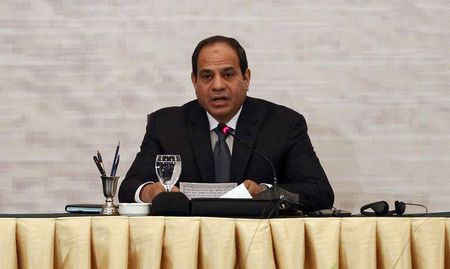GENEVA (Reuters) - Egyptian President Abdel Fattah al-Sisi's government defended its human rights record against Western and regional critics at a United Nations hearing on Wednesday, declaring that personal freedoms were among its prime concerns.
At a review before the U.N. Human Rights Council that all member states must go through every four years, Turkey and Tunisia said basic rights had been cut back in Egypt since the army's overthrow of elected Islamist president Mohamed Mursi in mid-2013 following mass protests against his rule.
Seven human rights groups based in Egypt said they had decided not to take part in the U.N. review of their country's performance, saying they feared anyone who spoke against the Cairo authorities would face persecution back home.
Representatives of the former army chief Sisi's government rejected the accusations of widespread repression of dissent.
"Human rights and freedoms of citizens come at the top of the priorities of the national government," Egyptian Transitional Justice Minister Ibrahim el-Heneidi told the session of the Geneva-based, 47-nation Council.
He said Sisi, who was elected president in March this year, "is keen to always emphasise full respect for human rights."
The United States said it was "deeply concerned with steps taken by Egypt that have resulted in violations of freedom of expression, peaceful assembly and association".
Britain said it was disturbed by the large numbers of people in pre-trial detention in Egypt, reports of torture, the use of mass trials and "the decreasing space for civil society and the media to operate".
Turkey, whose own Islamist-based government had close ties with the now jailed Mursi and his Muslim Brotherhood movement, pointed to what it called a "systematic and widespread use of unlawful lethal force by the (Egyptian) security forces...
"The continuing mass imposition of death sentences, without respect for the right to a fair trial of the defendants, is alarming," a Turkish envoy told the Council hearing.
The Council, an arena for sharp divisions between developed and developing countries over the meaning of human rights, will issue a report on the three-hour Egypt debate later in the week, with recommendations for any action. Egypt will have several weeks to say which of these it will accept.
Sisi's government has banned the Brotherhood and locked up thousands of its supporters, and police killed hundreds when breaking up two protest camps last year.

The net has since widened to include secular activists who played a leading role in the 2011 uprising that toppled long-serving autocrat Hosni Mubarak and ignited hopes for democratic change in the Arab world's most populous country.
(Reported by Robert Evans; Editing by Mark Heinrich)
